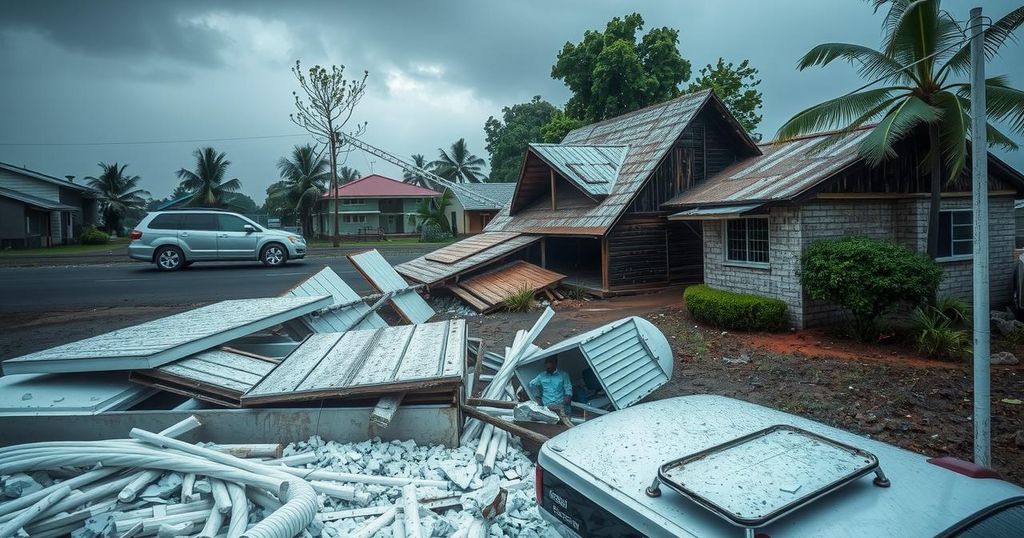Weather
World news
AFRICA, BLANTYRE, CHI, CHIDO, CHIP, CHIPILIRO KHAMULA, COMOROS, COMOROS ARCHIPELAGO, DEATH TOLL, DEPARTMENT OF DISASTER MANAGEMENT AFFAIRS, DISASTER MANAGEMENT, FLOODING, FLOODS, INDIAN OCEAN, KASUNGU, KHAMULA, LILONGWE, LUCY MTILATILA, MACHINGA, MADAGASCAR, MALAWI, MALAWI DEPARTMENT OF CLIMATE CHANGE AND METEOROLOGICAL SERVICES, MONSOON, MOZAMBIQUE, NACALA, NATURAL DISASTERS, SALIMA, U. N. OFFICE FOR THE COORDINATION OF HUMANITARIAN AFFAIRS
Lena Nguyen
0 Comments
Storm Chido Causes Fatalities and Destruction in Malawi
Tropical storm Chido has killed at least seven people in Malawi and affected over 30,000 others, damaging homes and infrastructure. Originating from the Indian Ocean, the storm caused significant destruction in Mozambique prior to impacting Malawi. Emergency responses are ongoing to assist affected households.
The tropical storm Chido has tragically claimed the lives of at least seven individuals in Malawi and has impacted over 30,000 others, according to reports from disaster officials. The Malawi Department of Disaster Management Affairs indicated that the storm resulted in significant property damage, including the destruction of roofs on schools, health facilities, and numerous homes. Among the fatalities, three occurred in Salima district, whereas Kasungu, Machinga, Blantyre, and Lilongwe each reported one death. In addition, sixteen individuals sustained injuries during the severe weather event.
Chido originated from the Indian Ocean, northeast of Madagascar, and made landfall near Nacala, Mozambique, on Sunday, where it inflicted extensive damages. A report from the U.N. Office for the Coordination of Humanitarian Affairs noted that more than 174,000 individuals in Mozambique and 64,000 in the Comoros archipelago were adversely affected, with thousands of homes being destroyed.
As the remnants of Chido passed through Malawi on Monday, it transformed into a moderate tropical storm, bringing heavy rains and flooding across approximately 17 districts, particularly in the southern region. Lucy Mtilatila, Director of the Malawi Department of Climate Change and Meteorological Services, stated that “the storm had dissipated,” although she advised vigilance regarding potential future storms emanating from the Indian Ocean. School classes, which had been suspended as a safety measure, have since resumed after the storm’s passage.
Chipiliro Khamula, spokesperson for the Department of Disaster Management, confirmed that all search and rescue teams have been withdrawn from the affected areas. He emphasized the collaborative efforts of the agency with various humanitarian partners to facilitate relief assistance for those impacted by the storm.
Overall, Chido caused significant loss of life and disruption in Malawi while prompting emergency responses and recovery efforts from both governmental and humanitarian organizations.
The article examines the impact of Tropical Cyclone Chido, which originated in the Indian Ocean and made landfall in Mozambique before passing through Malawi. The storm resulted in fatalities and widespread destruction, particularly affecting infrastructure such as schools and health facilities. By analyzing the aftermath of the storm and the response efforts of local and international agencies, the article highlights the importance of disaster management and preparedness in vulnerable regions.
In conclusion, Tropical Cyclone Chido has left a devastating impact in Malawi, resulting in seven fatalities and affecting over 30,000 people. The storm also caused significant damage to infrastructure, prompting a rapid response from disaster management authorities and humanitarian agencies. Continued monitoring for future developments in the Indian Ocean is crucial, as is the need for effective relief efforts to support those affected.
Original Source: www.voanews.com




Post Comment